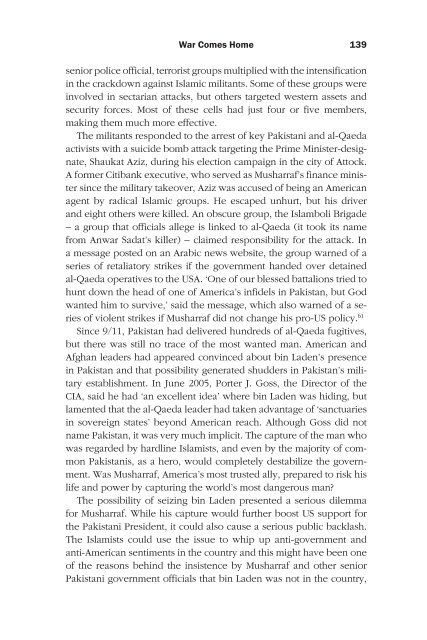Frontline Pakistan : The Struggle With Militant Islam - Arz-e-Pak
Frontline Pakistan : The Struggle With Militant Islam - Arz-e-Pak
Frontline Pakistan : The Struggle With Militant Islam - Arz-e-Pak
Create successful ePaper yourself
Turn your PDF publications into a flip-book with our unique Google optimized e-Paper software.
War Comes Home<br />
senior police official, terrorist groups multiplied with the intensification<br />
in the crackdown against <strong>Islam</strong>ic militants. Some of these groups were<br />
involved in sectarian attacks, but others targeted western assets and<br />
security forces. Most of these cells had just four or five members,<br />
making them much more effective.<br />
<strong>The</strong> militants responded to the arrest of key <strong><strong>Pak</strong>istan</strong>i and al-Qaeda<br />
activists with a suicide bomb attack targeting the Prime Minister-designate,<br />
Shaukat Aziz, during his election campaign in the city of Attock.<br />
A former Citibank executive, who served as Musharraf’s finance minister<br />
since the military takeover, Aziz was accused of being an American<br />
agent by radical <strong>Islam</strong>ic groups. He escaped unhurt, but his driver<br />
and eight others were killed. An obscure group, the <strong>Islam</strong>boli Brigade<br />
– a group that officials allege is linked to al-Qaeda (it took its name<br />
from Anwar Sadat’s killer) – claimed responsibility for the attack. In<br />
a message posted on an Arabic news website, the group warned of a<br />
series of retaliatory strikes if the government handed over detained<br />
al-Qaeda operatives to the USA. ‘One of our blessed battalions tried to<br />
hunt down the head of one of America’s infidels in <strong><strong>Pak</strong>istan</strong>, but God<br />
wanted him to survive,’ said the message, which also warned of a series<br />
of violent strikes if Musharraf did not change his pro-US policy. 61<br />
Since 9/11, <strong><strong>Pak</strong>istan</strong> had delivered hundreds of al-Qaeda fugitives,<br />
but there was still no trace of the most wanted man. American and<br />
Afghan leaders had appeared convinced about bin Laden’s presence<br />
in <strong><strong>Pak</strong>istan</strong> and that possibility generated shudders in <strong><strong>Pak</strong>istan</strong>’s military<br />
establishment. In June 2005, Porter J. Goss, the Director of the<br />
CIA, said he had ‘an excellent idea’ where bin Laden was hiding, but<br />
lamented that the al-Qaeda leader had taken advantage of ‘sanctuaries<br />
in sovereign states’ beyond American reach. Although Goss did not<br />
name <strong><strong>Pak</strong>istan</strong>, it was very much implicit. <strong>The</strong> capture of the man who<br />
was regarded by hardline <strong>Islam</strong>ists, and even by the majority of common<br />
<strong><strong>Pak</strong>istan</strong>is, as a hero, would completely destabilize the government.<br />
Was Musharraf, America’s most trusted ally, prepared to risk his<br />
life and power by capturing the world’s most dangerous man?<br />
<strong>The</strong> possibility of seizing bin Laden presented a serious dilemma<br />
for Musharraf. While his capture would further boost US support for<br />
the <strong><strong>Pak</strong>istan</strong>i President, it could also cause a serious public backlash.<br />
<strong>The</strong> <strong>Islam</strong>ists could use the issue to whip up anti-government and<br />
anti-American sentiments in the country and this might have been one<br />
of the reasons behind the insistence by Musharraf and other senior<br />
<strong><strong>Pak</strong>istan</strong>i government officials that bin Laden was not in the country,<br />
1













